White Supremacy - Blog Posts
not to harp back to a few days ago but the whole "taking phone calls in public/loud music in public/playing music and videos outloud in public is rude etc. (the list could go on)" argument is not only absurd,
(not all public spaces are going to be silent its is unrealistic, outside cannot cater to every single person as everybody has different needs, but this is not me dismissing there are concerns for people who may have sensory 'issues' or may be bothered by loud sounds)
but has ties to racism and classism, especially considering that many nonblack and white people call the police about "noise complaints" on black and brown people and poor people because the music being played at a party is 'too loud' or music from a car is being played 'too loud', which leads to them getting arrested or killed.
It also has links to gentrification, it is known that people who do complain about a community being too loud are clearly not familiar with the cultures in that area and that loud noise being a nuisance is a clear sign you are coming into a culture that isn't yours
anyway i think some of you need to read the article linked because the influx of these types of arguments is concerning.

the US war of independence was more about the worldwide conflict between the french and british colonial empires than it was about Freedom or Liberty. the US civil war was more about the competition of northern merchant-industrial capital and southern landed-agricultural capital than it was about Rights or Equality. wars aren't fought over ideology. of course those sentiments were real and existed, and of course no troops were actually charging into the battlefield out of personal love for one or the other segment of the bourgeoisie, but the sentiments supposedly behind these wars had existed long before the wars themselves came about. it was only when the actual centres of power wanted these wars that those sentiments and ideologies were able to come to the forefront. ideologies do not start wars, they are used to justify them. any benefit towards those ideologies is only coincidental insofar as it aligns with the real, material factors that create and maintain war. the US did not care about slaves, that much is clear from their antebellum treatment of black americans - they cared about slavery's economic effects, they cared about slaveowners


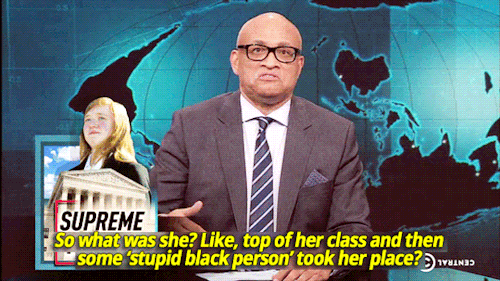


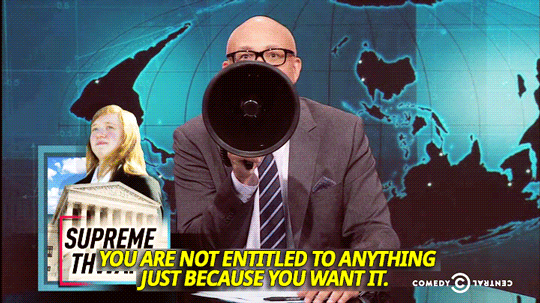
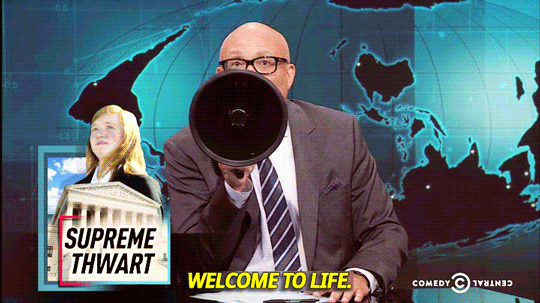
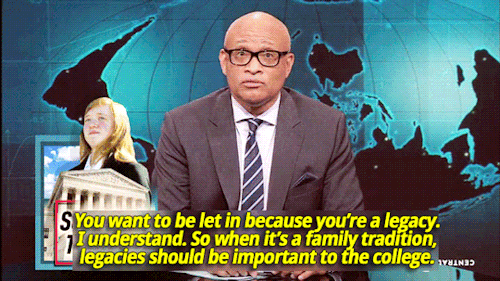
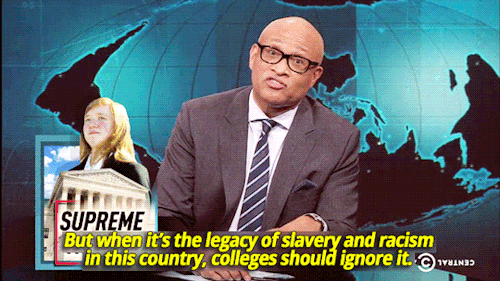
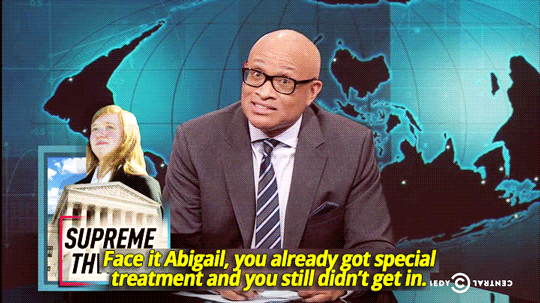
The Nightly Show, December 10, 2015

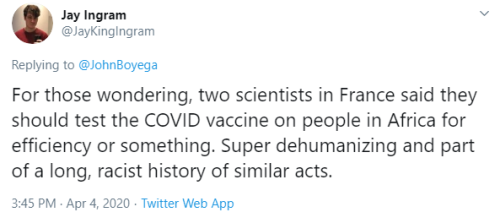
John Boyega: “Africa isn’t a testing lab you pieces of shit.”
Jay Ingram: “For those wondering, two scientists in France said they should test the COVID vaccine on people in Africa for efficiency or something. Super dehumanizing and part of a long, racist history of similar acts.”
Don’t let people pronounce your name wrong - don’t let them see you walking home. Don’t let them see your mother in the playground, smelling of spices. Bite your lip when you see a white woman in the street wearing a shalwar kameez. ‘I’m on the way to a wedding,’ she drawls. ‘A friend got me this s-…this thing. Isn’t it pretty?’ I don’t know, lady. Tell me, how much do you care about the merchants who jumped to their feet and dove through reams of fabric to find the right one? Are you trying to tell me that I shouldn’t be angry that you’re wearing a garment I can’t wear without eye rolls and insults and, ‘fucking Paki. Go back to India, go back to where you came from.’ I was born here, and I’ve earned my place here. More so than you. I’ve had to work for it. I’ve had to know my shit countless times, be able to list off members of the government on both hands, talk this way, eat this way - my parents stopped sending me to school with rice so early because the other kids couldn’t fathom lunches that weren’t sandwiches. Can you even pronounce ‘shalwar kameez’? Let me hear it, I’m not convinced. I don’t know, my teacher had to ask me how to say my name three times this morning - and each time I said it she would repeat it slowly, squinting, as though it were made from a different alphabet. So I guess you could say I’m a sceptic. Wait. Is that a bindi on your forehead? Where’s your temple? More importantly, where were you yesterday when my Religious Education teacher was telling me how the whites helped educate the poor little Indians and that 1947 was a bad year for ‘us’? My country’s independence was the Empire’s downfall, and the Empire gave us nothing but pain. My grandparents were driven off the border of Pakistan and forced into poverty, and here was a person trying to tell me that the colonies that terrorised my family away, away from their homes and their cities and their loves, did a good thing. Where were you then? I see the henna on your hands, and I am here to say that my culture is not a trend for you to love this season and throw away - my heritage is not your excuse to be ‘exotic’. You are not welcome to pick and choose the attractive parts of being me. Take my mother’s bindi spot, take the unwanted advances of old white men that come along with it - they think we should be honoured to be hit upon by a white man. Take the henna off my hands, and take the sweat and blood of Indian workers trying to make an honest day’s work charging fifty rupees in the street to ice patterns on flesh. Take my sari, take my shalwar, take my lengha and take the low self esteem that growing up in a white society has given me. Take it, take it all.
it might be in this month’s ‘vogue’, but that doesn’t make it yours | ishani jasmin (via ishanijasmin)
I think it's very important to talk about this.
In today's world even the weak, the poor and the disenfranchised are empowered to speak and that's undoubtedly a huge step forward on the arc of history. Inequalities, in relation to representing ourselves, are being diminished. I mean it in the sense that the internet and the social media have given us platforms, where you can upload your content, even if you have far-from-professional equipment and an amazing number of people have access to it. On the internet people choose for themselves what kind of content they view or read or listen to, ergo people's inclination and taste are the major factors contributing to getting heard and not the wealth of content-creators.
After this rather lengthy introduction, let's get to the point.
As the poet's mastery cannot be argued, her point may be the more so.
Even the first issues mentioned are quite strange. How can an English speaker be expected to pronounce Indian words right? And this is a returning motif. I don't want to waste many words on this question but just say, the poet goes to Denmark and she can pronounce all the names properly? Is the source of this complaint that she can pronounce the English names perfectly and it's different the other way around? Is the part:"as though it were made from a different alphabet" suggesting that the Indian people speak identical to Americans? This whole issue may lead to something more profound and more light may be shed on the source of her frustration as I progress with my arguments.
I would also like to note that the poet is offended by white people wearing Indian traditional garments, without understanding that culture or caring much for it. I find this a very complicated issue and this might be discussed later, too.
The whole poem is filled with anti-imperialist, anti-white feelings and the words are very suggestive. They suggest intolerance, racism, cultural disrespect and such things, which surely originate from experience and a certain kind of environment.
If the poet's environment majorly consists of people, who behave uneccaptably, maybe it's really about time for her to move. I know it sounds bad to ask a victim to change, rather than changing the villains or moving them but in this case it's simply the better solution--of course I only mean this in a theoretical sense, not literally. I said what's above because America does not majorly consist of people acting and speaking filled with racism and/or intolerance. It may be said that certain studies--very reliable ones--show that most Americans have racist attitudes but--just as reliable--studies also show that despite those suggested attitudes, most Americans act and/or speak tolerantly and in antiracist ways. So if it is true that the poet mostly meets racism, intolerance, then she just so happens to live in an improbable place, but she could move almost anywhere and would be treated differently. But if she doesn't live in this very unfortunate coincidence, then it may be that she's the victim of a hurtful minority. However, if that's the case, and she's writing a poem about this smaller group of people, I have to say that it's not a tendency, much rather the ugly side of human nature, very similar to that part of it, which is called criminality; and it's not all right to commit a crime, as it is not all right to be racist or intolerant but it cannot be eradicated completely--quite sadly--but it will remain with humanity forever.
The poet suggests that white people don't have adequate knowledge of her culture, yet they exploit it. If a person is not a part of a given culture, he/she cannot choose to cherry-pick some of the attractive parts of given culture--argues she. It might be based on:
#1: the idea that people, who belong to her culture, have a certain narrative identity, which will also manifest in their culture. This identity brings a lot of pain and a lot of joy but for someone to ignore the pain and embrace the joy only, would leave the rest of the people with a very bad taste: that they have to live with the pain as well and it is an unfair thing for someone to experience their joy without having to experience their sorrow. This suggestion, however, is ignorant toward the fact that people from other cultures have their own pains, ones that may be entirely dissimilar but nonetheless serious.
#2: the idea that selecting attractive parts of their culture will spread an idealized, romanticized version of given culture, thus making the people ignorant toward the things they've suffered. For this to be true, it would also have to be true that these certain manifestations spread in a way that will affect how people look at Indian culture. It is possible that it forms people's views and they will, in fact, have certain stereotypes, romantic ideas about this culture but what must also be observed is that fashion does not take something else's place. Newspapers aren't afflicted by fashion clichés--they might be afflicted by other clichés but that's not the question. So if someone has an image, solely based on fashion's impact, then that person would have no idea at all without the Indian garments. The real question is: is it more detrimental to think about India as the place where there are beautiful clothes, than not thinking anything about India at all. As far as I can tell, they aren't very different in effect, since none of them will make anyone have hostile attitudes toward India and none of them will make anyone more friendly toward her.
#3: the idea that selecting the attractive parts of their culture will make the people subject to stereotypes. It is, of course, terrible to be looked at as already completely known, just because belonging to this or that culture. We demand to be seen in our full complexity and uniqueness and that seems to be our right to do so. What is not observed here is that people can't view others in their complexity, only a few of them, at maximum. So if a certain culture's stereotype will contribute to another stereotype that others are forming about you, it's not unwise to keep in mind that no one really is perceived as they are by the vast majoriy of people they meet. I know it's an important issue today to fight prejudice in the world but prejudice cannot be undone, and it is basically a mistake to oppose it; it originates from identifying prejudice with racism, which might be defined as a certain kind of prejudice but then, prejudice is just a certain kind of attitude, which we all have toward all sorts of things and there's nothing we have against that.
I'd like to mention how the poet discusses India's relation to the West. There's a nod to the general notion of America exploiting their cheap labor and the evil Empire that once ruled half the world.
#1: The US could have a better way of dealing with cheap labor, that's true, of course, however, she can't be blamed for the poverty in India. There's been economic struggle for a long time and its roots go back to social strife, which did not ease with the hardships of pathfinding in he second half of the 20th century, though it's been there even before that. And the way world economy has moved forward was rather hard for India to figure out and a lot of poor decisions have been made, which of course, don't mean that India would be responsible for all of the bad things happening there but it's still mandatory to consider that before looking at richer countries with contempt. And what's also important to see is that India's improving rapidly now and she's been on the curve going up for a little while now, so there's no need to look at her as a mud-hole of poverty, since her fate is not written in stone. And last but not least, not all Indians are browsing among fabrics. Truth be told, the poet isn't doing much for those merchants, either, just by thinking about them or being their comrade. Economic growth, unbuyest bureaucracy and clean politics could be of tremendous help to them and I hope we're going that way--at least as far as I can choose to do my work in favor of that.
#2: The British Empire was, before everything else, seeking her own interests in the world. It's understandable on one side and it means having India on the second place, at most, on the list of priorities, on the other side, which isn't ideal for India. Well, this is how it's easy to think about it but it isn't how it is. India's relationship with the Empire was very complicated with a large amount of both ups and downs on their way together, so it's always very hard to say it was good or bad for India. It was complicated. The poet referred to 1947, which was the year, when India became independent and also when she broke up into India and Pakistan. I don't know whether the poet's family was on India's or on Pakistan's side at the time of this affair but to blame the British for the bad things that happened then is completely nonsensical. When the Indo-Pakistani War, mainly over Kashmir, happened, and when immense crowds of people had to leave their homes because of things out of their power and interest, it was Lord Mountbatten, who had to go back with his forces, to a country, that had already gained its independence, only to try to moderate this humanitarian catastrophe. Even Nehru, the current leader of India at the time, saw it better to have the British forces there, which doesn't mean that their presence was absolutely good or absolutely bad, just that they aren't the disruptors of India.
The poet supposes, but never explicitly mentions, that there's white supremacy in he world, causing pain and turmoil all over the globe. It can be seen in her personal experience, in her narrative identity and from these we can have a general idea about the phenomena. But let me ask: is the poet right in her arguments? If we look at the people who liked her post, can't we see quite a few white people there? When people hurt her, oppress her, say racist things, does it happen because they're white? Are all white people like that?
It is plain to see that not all white people are disrespectful. I value the poet's poetry but I also value her culture, even so, I've chosen to learn about it, so that I could understand it more fully and not live in the world of dumb stereotypes. I respect the poet and I'm white and I know I'm not alone.
Just a sidenote: It would be out of this world to talk about the collectivity of white people, as we could discuss Hungary's* complicated relationship with the US. Hungary's not a rich country, the major difference between her and India would be that western people think India's more exotic but they'd probably consider them both quite alien.
This piece of poetry is full of thoughts and I know I've eventually failed to grasp them all and respond to them all. I don't mean to hurt the poet or say this verse is bad, as it is not. What I'm trying to do is to bring us closer to each other--I want us to see that we're not really that far away anyway.
*Hungarian people are also mainly white people.
Eugenics, and how it leads to gender
NO.1
What is eugenics? Better yet, what was the eugenics movement about? Wikipedia states that ‘'it’s a set of beliefs and practices that aim to improve the genetic quality of a human population, historically by excluding people and groups judged to be inferior or promoting those judged to be superior. In recent years, the term has seen a revival in bioethical discussions on the usage of new technologies such as CRISPR and genetic screening, with a heated debate on whether these technologies should be called eugenics or not.’’

NO.2
The concept was created by Plato, where he suggested the concept of selective breeding; but the term was invented by a cousin of Darwin, Francis Galton, who launched the movement to ‘improve the human race, or at least, to halt its perceived decline. His ideas spread quickly, and by the 1920s eugenics movements existed all over the world. Eugenics, a movement for social betterment clothed in the mantle of modern science, claimed the allegiance of most genetic scientists and drew supporters from the political right, left, and center. The movement was embraced by Hitler and the rise of Nazism, which thankfully lost most of its power at the fall of the Third Reich in Europe and America, but some of its ideas still linger in the States. Like the notion of gender and marriage; strictly speaking, of white heterosexual couples.

NO.3
In the 1920’s eugenicist, Paul Popenoe brought marriage counseling to the U.S, where he sought to protect ‘family values’ since there was widespread concern over the declining white birth rates and created the American Institute of Family Relations (AIFR) where they popularized pseudoscientific sexual differences to the masses. Back then, everything in pop culture had little trails leading back to eugenics, including in schools, taught to their children, plastered as ads to their buildings, like pamphlets and books, all on advocating for the white female students to produce more children. Popenoe argued that the ‘male-female difference transcended all other human differences and was the ‘greatest that can exist between the two normal human beings.’ He felt that was this sex binary was essential to the survival of the family, nation, and western civilization, and therefore must be protected from the decadence of modern society.

NO.4
Post-war eugenicists were threatened by the higher education women which they felt decreased ‘natural birthrates and called for traditional marriage with defined sex-gender roles arguing that ‘men and women were made for marriage, biologically and psychologically.’ Patricia Hill Collins explains in her book, “It’s All in the Family: Intersections of Gender, Race, and Nation that ‘‘stationed in the center of ‘family values’ debates is an imagined traditional family ideal. Formed through a combination of marital and bloody ties, ideal families consist of heterosexual couples that produce their own biological family. Defined as a natural or biological arrangement based on heterosexual attraction, this monolithic family type articulates with governmental structures. Because family constitutes a fundamental principle of social organization, the significance of the traditional family ideal transcends ideology. In the United States, understandings of social institutions and social policies are often constructed through family rhetoric. Families constitute primary sites of belonging to various groups: to the family as an assumed biological entity; to geographically identifiable, racially segregated neighborhoods conceptualized as imagined families; to so-called racial families codified in science and law, and to the U.S nation-state conceptualized as a national family.’’

Having grown up next to a very real sundown town, and having dealt with these people for 20+ years as a result of it, after about age 12 or 13, most people who can be "saved" from that ideology start saving themselves because they recognize it's fucked. The ones who can't be saved start justifying and rationalizing it, first in their own heads, then outloud to others. Having watched Klan marches while just trying to go to the dentist, having been spat on for being a "race traitor" having had to physically defend friends from attempted hate crimes, having had to help put out a burning cross on a friend's yard, fuck the mentality that we have to coddle them. The ones who need coddling still hold those same ideologies. The ones who have truly reformed don't ask for forgiveness, just to be allowed to fight back alongside us, and they shut the fuck up, keep their heads down, and sure as shit don't glorify their old ideology or try to dismiss it as "haha I was so quirky when I had that little Nazi phase" they are genuinely remorseful, accept how bad the shit they did was, don't play it off, and work their asses off to dismantle the groups they were in.



There is something revealing here and in other notes of that post. I'm trying to put my finger on it...it's as if there is an acceptance that White Supremacy, while wrong, is a privilege people are allowed to indulge in, and so other people need to endlessly be patient and rehabilitate them. Like it's a White Right, like of course they get to explore their evil legacy a bit, in order to discover it's wrong. And/or that fascism/white supremacy/ideological racism is something anyone could fall "victim" to if they were exposed to the same "magical" radicalization material, and not that people who "fall into" hate groups already have a fundamental world view that is precedent...they start from a place where the natural logical progression is an all powerful ethno-state.
It's also revealing that a hypothetical reformed neo-nazi must needs constant validation and forgiveness lest they fall back. Presumably someone who has exited a hate group like this, truly reformed, would not seek validation, they would have the wherewithal. They would self-actualize, and understand why. But it's revealing isn't, that they can forgive a "nazi phase" because the risk is that they could return to a "nazi phase"...so what are these people imagining they are forgiving? They aren't imagining forgiveness, they are imagining some sort of mutual sycophantic theater where politics is just...the posts you make on the internet I guess. Idk, lots to think of here. I don't think these people have met real creeps, the kind that make your skin prickle. I don't think these people have engaged at any level what neo-nazi material looks like.
